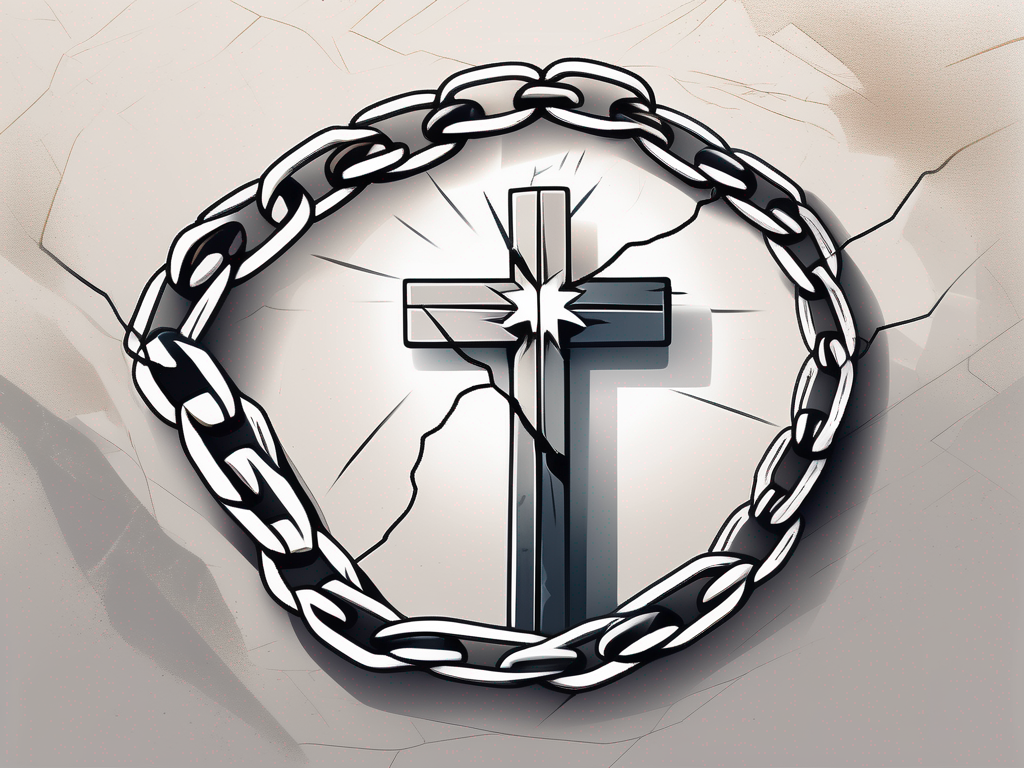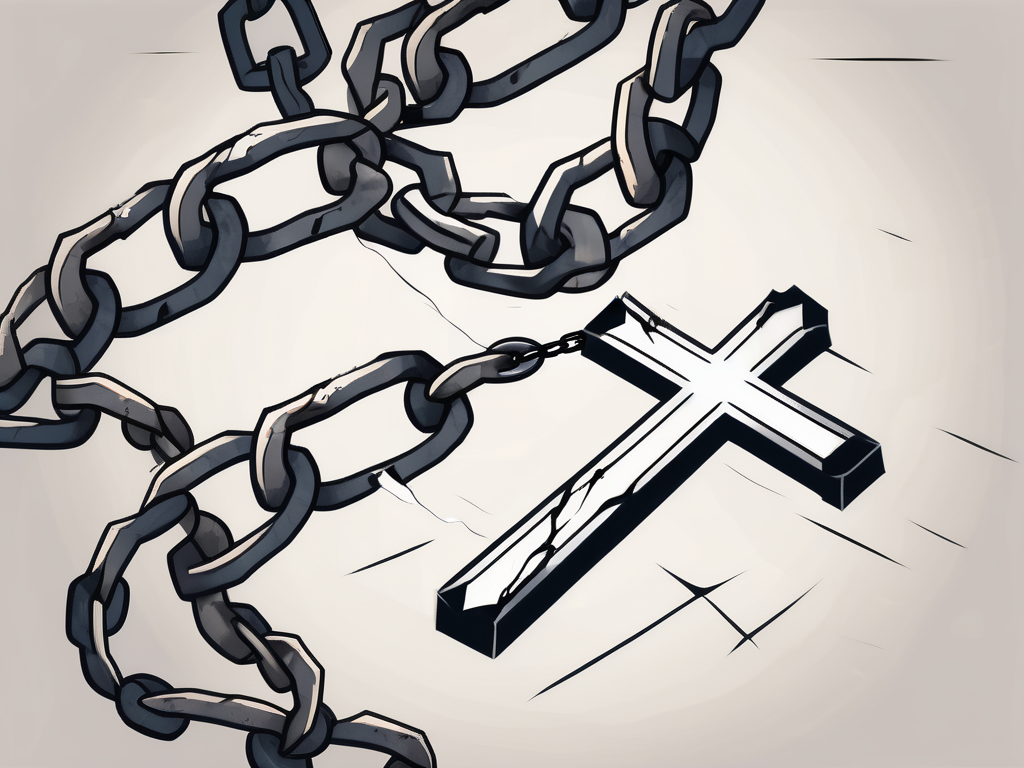Regret is a universal human experience. We have all felt the pang of remorse, the burning desire to turn back time and undo our mistakes. But what does the Bible say about regret? How does it define and address this complex emotion? In this article, we will delve into the biblical perspective on regret, exploring its purpose, its impact on our spiritual growth, and the guidance it provides for navigating through life’s regrets.
Understanding the Concept of Regret in Biblical Context
Before we explore what the Bible says about regret, let’s first delve into its definition from a biblical perspective. Regret, in the biblical sense, is more than just feeling sorry for our past actions. It involves a deep sense of remorse and a willingness to turn away from our past mistakes. It is through this lens that we can begin to understand the role of regret in our spiritual journey.
Defining Regret from a Biblical Perspective
In the Bible, regret is often connected with repentance. It involves recognizing our wrongdoings, feeling remorseful for them, and ultimately turning away from them. It is not simply a fleeting feeling of guilt, but a sincere desire to change our ways and seek forgiveness from God.
When we look at biblical examples of regret, we see characters like King David who deeply regretted his affair with Bathsheba and the subsequent murder of her husband, Uriah. David’s regret was not just a surface-level feeling of guilt, but a profound sorrow that led him to pen the heartfelt psalm of repentance, Psalm 51. His regret drove him to seek forgiveness and restoration with God, demonstrating the transformative power of genuine remorse.
Furthermore, regret in a biblical context is not limited to specific actions or sins. It extends to the overall state of our hearts and our relationship with God. It is a recognition that we have fallen short of God’s perfect standard and a desire to align ourselves with His will. This type of regret goes beyond individual actions and encompasses a holistic understanding of our need for redemption and restoration.
The Role of Regret in Spiritual Growth
At times, regret may seem like a burden too heavy to bear. However, from a biblical perspective, regret plays a crucial role in our spiritual growth. It serves as a catalyst for self-reflection, leading us to examine our actions and their consequences. Through regret, we gain a deeper understanding of our flaws and shortcomings, paving the way for personal growth and transformation.
When we experience regret, it prompts us to evaluate our choices and behaviors. It invites us to confront the consequences of our actions and consider how they align with God’s principles. This process of introspection and evaluation allows us to identify areas in our lives that need improvement and seek God’s guidance in making necessary changes.
Moreover, regret can foster humility and dependence on God. It reminds us of our fallibility and the need for His grace and mercy. As we come face to face with the consequences of our actions, we are humbled by our own limitations and recognize our need for a Savior. Regret, therefore, becomes a catalyst for surrendering our pride and embracing God’s transformative work in our lives.
Additionally, regret can serve as a powerful motivator for future growth. When we genuinely regret our past mistakes, we are more likely to make intentional efforts to avoid repeating them. Regret fuels our determination to live in alignment with God’s will and empowers us to make better choices moving forward.
In conclusion, regret, in a biblical context, is not merely a fleeting feeling of guilt but a deep sense of remorse that leads to repentance and transformation. It plays a vital role in our spiritual growth by prompting self-reflection, fostering humility, and motivating us to align our lives with God’s will. As we embrace the lessons learned from our regrets, we can experience personal growth and draw closer to God.
Biblical Passages Addressing Regret
The Bible provides us with numerous passages that address the subject of regret. From the Old Testament to the New Testament, these verses offer insights and teachings on how to navigate through the challenges of regret.
Old Testament References to Regret
Throughout the Old Testament, we find examples of individuals who experienced regret. King Saul, for instance, deeply regretted his decision to disobey God’s commandments and lost his kingship as a result. Yet even in his regret, he found solace in seeking God’s forgiveness and mercy.
Regret can be a powerful motivator for change. It can serve as a reminder of our fallibility and the consequences of our actions. In the case of King Saul, his regret led him to seek reconciliation with God and strive for a better future.
Another powerful example is found in the story of King David, who committed adultery with Bathsheba and later regretted his actions. In Psalm 51, David pours out his heart to God, seeking forgiveness and expressing his deep remorse.
David’s regret serves as a cautionary tale, reminding us of the importance of staying true to our values and making wise choices. It shows us that even the most revered individuals can succumb to temptation and experience regret, but it is through sincere repentance that we can find redemption.
New Testament Teachings on Regret
In the New Testament, we encounter teachings on regret through the parables of Jesus. The Parable of the Prodigal Son, for instance, portrays a young man who squanders his inheritance and lives a life of regret. However, through the Father’s unconditional love and forgiveness, the prodigal son finds redemption and a second chance.
This parable teaches us that no matter how far we have strayed or how deep our regrets may be, there is always hope for reconciliation and restoration. It reminds us that God’s love is limitless and His forgiveness knows no bounds.
These biblical passages remind us that regret is not the end of the story. It is through repentance and seeking God’s forgiveness that we can find healing and hope, even in the midst of our deepest regrets.
Regret can be a catalyst for personal growth and transformation. It can lead us to reevaluate our choices, seek forgiveness from those we have wronged, and make amends. It is a reminder that we are not defined by our mistakes but by how we respond to them.
Furthermore, these passages highlight the importance of forgiveness, both from God and from others. They teach us that holding onto regret and guilt can hinder our spiritual and emotional well-being. Instead, we are encouraged to seek forgiveness, extend forgiveness, and embrace the opportunity for a fresh start.
Ultimately, the biblical passages addressing regret offer us guidance and encouragement in navigating the complexities of life. They remind us that regret is a universal experience, but it does not have to define us. Through faith, repentance, and forgiveness, we can find redemption and live a life free from the burdens of regret.
Theological Interpretations of Regret
When we examine regret through a theological lens, we discover two key aspects: regret as a catalyst for repentance and regret in light of God’s forgiveness.
Regret, when embraced with a genuine desire to change, can lead us towards repentance. It reminds us of the importance of aligning our actions with God’s will. It compels us to turn away from our past mistakes and seek forgiveness, ultimately leading to a renewed relationship with God.
But what exactly is repentance? Repentance is not simply feeling sorry for our wrongdoings, but it involves a sincere change of heart and a commitment to live differently. It requires us to acknowledge our mistakes and actively seek to make amends. When regret serves as a catalyst for repentance, it propels us towards a path of transformation and growth.
Furthermore, regret can also be viewed in the context of God’s forgiveness. The Bible reassures us that our regrets are not beyond the reach of God’s forgiveness. His love is unconditional, and he offers forgiveness to all who come to him with a repentant heart.
Imagine a person burdened by regret, weighed down by the weight of their past mistakes. They may feel unworthy of forgiveness, trapped in a cycle of guilt and shame. But God’s forgiveness is a powerful force that breaks through these barriers. It is a healing balm that soothes the wounds of regret and offers hope for a better future.
God’s forgiveness is not limited by the magnitude of our regrets. It extends to every corner of our lives, embracing even the darkest moments of our past. When we approach God with a repentant heart, seeking his forgiveness, we can experience a profound sense of liberation. The chains of regret are broken, and we are set free to live a life of purpose and joy.
Moreover, God’s forgiveness is not a one-time event but a continuous process. As we journey through life, we may stumble and make mistakes along the way. But God’s forgiveness remains ever-present, always ready to embrace us with open arms. It is a constant source of comfort and reassurance, reminding us that we are never alone in our struggles.
So, when we consider regret from a theological perspective, we see that it is not merely a negative emotion to be avoided or ignored. Instead, it can serve as a catalyst for repentance, leading us towards a renewed relationship with God. And in the light of God’s forgiveness, regret loses its power to hold us captive. It becomes an opportunity for growth, healing, and transformation.
Dealing with Regret: Biblical Guidance
Regret can be a heavy burden to bear, but the Bible provides invaluable guidance on how to navigate through it. The scriptures offer us wisdom and comfort, reminding us of God’s unfailing love and mercy.
Prayers for Overcoming Regret
One powerful way to deal with regret is through prayer. The Bible encourages us to pour out our regrets to God, seeking his comfort and guidance. When we bring our regrets before God, we acknowledge our need for His help and surrender our burdens to Him. Through prayer, we can find solace and the strength to move forward, knowing that God hears and answers us.
As we pray, we can ask God to reveal His purpose in our regrets and to guide us towards healing and restoration. We can seek His forgiveness and ask for the wisdom to learn from our mistakes. In prayer, we can find reassurance that God’s grace is greater than our regrets.
Scriptures for Comfort and Release from Regret
Additionally, the Bible offers comforting scriptures that remind us of God’s steadfast love, mercy, and grace. These verses can bring solace and peace to our hearts, helping us release our regrets and find hope in God’s redemptive power.
One such scripture is found in Psalm 103:12, which says, “As far as the east is from the west, so far has he removed our transgressions from us.” This verse reminds us that when we seek God’s forgiveness, He removes our sins and regrets from us, offering us a fresh start.
Another scripture that provides comfort is found in Isaiah 43:18-19, which says, “Forget the former things; do not dwell on the past. See, I am doing a new thing! Now it springs up; do you not perceive it? I am making a way in the wilderness and streams in the wasteland.” This verse encourages us to let go of our past regrets and focus on the new things that God is doing in our lives. It reminds us that God can bring beauty and restoration even out of our deepest regrets.
Furthermore, in Romans 8:28, we are reminded that “in all things God works for the good of those who love him, who have been called according to his purpose.” This verse assures us that even our regrets can be used by God for our ultimate good. He can bring about redemption and growth from our mistakes.
As we meditate on these scriptures, we can find comfort and release from the burden of regret. They remind us that God’s love and grace are greater than our past mistakes. By embracing His forgiveness and trusting in His plan, we can find healing and restoration.
Moving Forward: The Bible’s Message on Living Without Regret
The Bible not only addresses the concept of regret but also provides a message of hope and renewal. It calls us to embrace God’s grace and mercy and live a life free from the shackles of regret.
Embracing God’s Grace and Mercy
God’s grace is greater than our regrets. It is through his grace that we find forgiveness and the strength to let go of our past mistakes. By embracing his grace and relying on his mercy, we can experience the freedom to live without the burden of regret, knowing that we are loved and accepted by a forgiving God.
The Power of Redemption and Second Chances
The beauty of the biblical message is the power of redemption and second chances. No matter how deep our regrets may be, God offers us the opportunity to start anew. Through his redemptive work, he transforms our brokenness into something beautiful, allowing us to walk forward in freedom and purpose.
In conclusion, the Bible acknowledges the reality of regret but offers us a pathway towards healing, growth, and redemption. By understanding the biblical perspective on regret, we can find solace, guidance, and hope in the midst of our deepest regrets. May we embrace God’s grace, seek forgiveness, and live a life free from regret, knowing that we are eternally loved and cherished by our Heavenly Father.












